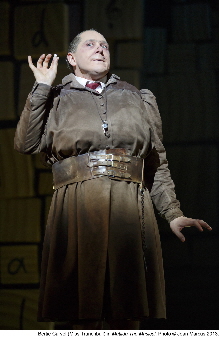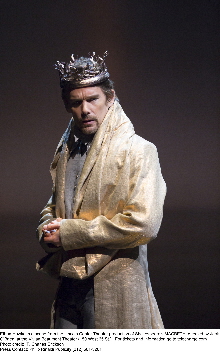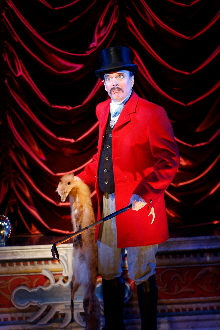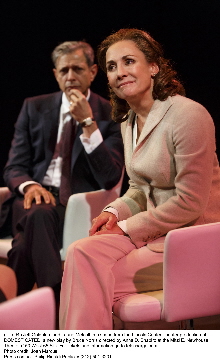By Bill Hirschman
A critic’s trip to New York City to overdose on theater is like taking a semester’s worth of object lessons for both audience members and theatrical professionals.
A pre-holiday foray to a snow-struck Broadway delivered a master class of insights that last beyond a temporary season, whether it was Macbeth or Matilda, The Glass Menagerie or A Gentleman’s Guide to Love and Murder, even A Night With Janis Joplin, Domesticated and Murder For Two.
Some shows closed days after we left, some are still running, but all of them are worth examining, whether it shows how to revamp a classic play, or sheds light on the debatable irreplaceability of a lead actor, or the inadvisability of star casting a play without a compelling actor in the linchpin part. Some of these shows will tour in South Florida like Matilda, some likely won’t so you should see them on your next trip like A Gentleman’s Guide to Love and Murder.
Matilda: The Phantom of the Opera “Irreplaceability” Phenomenon
About 25 years ago, producer Cameron Mackintosh moved heaven and earth to have Actors Equity Association allow Michael Crawford and Sarah Brightman to recreate their roles when Phantom moved from the West End to Broadway. He and composer Andrew Lloyd Webber insisted the specific actors’ presence were crucial to the success of the piece. Webber refused to let the show open without Brightman, leading to complex negotiations with Equity. But, in retrospect, that argument proved to be ludicrous given the parade of supremely competent actors who followed as the Phantom and Christine with no noticeable lack of attendance over the past decade or so.
This was underscored on our trip by Matilda, the current hit musical based on Roald Dahl’s dark but ultimately uplifting tale about a supernaturally endowed child abused by her family and the headmistress of a nightmarish school. The key role is of Miss Trunchbull, the sneering, malevolent and hulking headmistress and former Olympic hammer tosser. It was played in London by Bertie Carvel to critical and popular acclaim. Producers brought to New York the inestimable Mr. Carvel who was universally praised regardless of the deeply divided reaction to the show itself.
A few months ago, Carvel’s contract expired and producers hired Craig Bierko, a very talented American best known for channeling Robert Preston in the 2000 revival of The Music Man. But some acrobatics required of the role reportedly sidelined Bierko and his part was temporarily taken over by his understudy Chris Hoch. Eventually, by the time we saw it, Hoch had the role full-time. Bottom line: Hoch was terrific and with no one to compare him to, no one in the audience felt cheated at all.
There’s no question that stars – not celebrities but true stars – bring something to a portrayal that is magic (see our discussion further on about A Gentleman’s Guide and A Night With Janis Joplin). Additionally, in the past decade or two, star power and name recognition seems crucial to the early financial success of a show if the quality of the property is just adequate. If producers last season had tried to replace Bette Midler in the Sue Mengers play I’ll Eat You Last or Tom Hanks in the Mike McAlary play Lucky Guy, the box office would have cratered, assuming the plays were mounted at all.
But if the material itself is strong, the bench for good acting runs deep, as Matilda proves. The long runs and multiple productions of every show from Hello, Dolly! to Red prove that the best shows can survive a cast change. No one is irreplaceable.
While we’re at it, we’ll weigh in briefly on the merits of Matilda, which is destined to arrive locally someday. The story is a delightful piece filled with the dark mordant wit that Dahl loved. The Royal Shakespeare Company’s production has a quirky but appealing score by comedian Tim Minchin and a script by Dennis Kelly that glorifies the resilience of children in the face of adult venality and stupidity.
Especially striking is the visual look and overall tone, a celebration of childhood memories and adult nightmares featuring oversized alphabet blocks, courtesy of Matthew Warchus’ staging, the set design by Rob Howell and a raft of special effects.
The real weakness on Broadway was (and is) the lyrics were often unintelligible due to the thick British accents affected by the American actors and the stunningly poor sound quality. Here’s the thing: We saw Matilda about a year after it opened and those criticisms were the same ones written about it opening night. That’s downright inconceivable and inexcusable. Our advice is to listen to the original cast album several times before you go to see it either in New York or on the road.
Youngsters will be reasonably enchanted because many of the cast members are children, or adults playing children, or adults playing adults acting like children. But this tribute to imagination and childhood really is aimed at grown-ups remembering the trials of being a child. While not everyone will take to the piece, it’ll be well worth a ticket when the tour comes through.
Macbeth: “But He Doesn’t Know The Territory”
Speaking of stars: Much of the pre-opening hype about the Macbeth revival that played during the early winter centered on the casting of Ethan Hawke as the cursed thane. In some quarters, the production at Lincoln Center was likely referenced as “the Ethan Hawke Macbeth.”
In reality, it was the Jack O’Brien Macbeth, O’Brien being the famed director whose credits range from Hairspray to Tom Stoppard’s trilogy The Coast of Utopia. As good as O’Brien is, it’s rare that a director’s vision alone is enough to sustain an entire evening of Shakespeare, Julie Taymor notwithstanding.
O’Brien did not necessarily plan it that way this production proved just what an inventive stylist he is in reconstituting the venerable tale of guilt, murder, politics and ghosts.
But indie movie star Hawke, who has something of a legit stage track record including the bard’s Henry IV, was an uninvolving cipher whose voice was less than regal and who never inhabited the character. He had no feel for Shakespearean speech, even the naturalistic style championed by Kenneth Branagh. He could never have survived an open call audition. His lady, played by experienced English Rose Anne-Marie Duff, was also lackluster. They were outclassed by Richard Easton as the doomed King Duncan (who doesn’t survive the first act), Daniel Sunjata as a beefcake Macduff (who hasn’t a lot to do until the end, as in, “lay on, Macduff”) and John Glover as one of the sexless witches.
Without a focal point, O’Brien’s profligate imagination took over the spotlight. For instance, the three witches played a more active role including portraying some of the minor parts and acted as a running Greek, well Scottish, chorus. There also was stunning staging that took full advantage of the Lincoln Center Beaumont Theater, which reaches so far back that the actors seemed to make their entrances from New Jersey. All of which is entertaining but can’t make up for a Shakespearean masterpiece without a central character.
It reminded us of a South Florida production of a Jerry Herman musical a few years ago that required a strong actress as the central title character. Memorably, the actress was a decade too young, her voice wasn’t up the task and she could barely act when she wasn’t singing. Bottom line: When lining up your season, make sure there’s someone around on the wings who can hold your show together, even if you later cast someone else out of auditions.
The Glass Menagerie: A Good Argument For Reinventing The Wheel
It took courage to tinker with Holy Writ. A clearly closeted Tom had a strange Southern accent that sounded more Tommy Lee Jones than Tennessee Williams. Amanda was more sympathetic than off-putting – and less vivacious. The Gentleman Caller was less a self-involved jerk than a sympathetic someone who has discovered his inadequacies once he ran smack into real life after high school. Laura was virtually invisible for the first half of the play, except when she made a magical first appearance coming literally out of a sofa.
The lesson from the recently-closed revival of The Glass Menagerie was the rewards that come when an audience is persuaded to jettison their memories of previous productions and their expectations.
It’s not that this was a radical reinterpretation, but it took many observers several minutes, even several scenes to open themselves to director John Tiffany’s reimagining of the Williams classic. But those who could remain available to it felt like they were discovering the play anew.
Tiffany and his movement specialist Steven Hoggett, who put together the glorious Black Watch and more recently Once, took a cue from William’s reference to this being a memory play as license to create a very impressionistic evening. For instance, before and after each of Tom’s retrospective narrative monologues, he seemed to literally fall into and out of the remembered scene as if it were a featherbed or a snowbank. Between scenes, Amanda and especially Laura had extensive silent pantomime scenes of housekeeping chores.
The production benefited from a central performance by the transcendent Cherry Jones as an Amanda who was far from a risible scold, but in fact genuinely concerned about what would happen to her children in the uncertain future. Zachary Quinto’s quirky take on Tom created a haunted man not comfortable in his own skin.
The production had its weakness such as noticeably muted strife between Amanda and Tom, which made his eventual desertion seem churlish and selfish, not an inevitable necessity. The entire play started quite slowly and took time to grow on you. Tom did not have you mesmerized from the storyteller’s opening line of “I have tricks in my pocket.”
But in its way, it was reminiscent of New Theatre’s equally fresh production in 2009 in which every line reading made it sound like a new play. I asked Angie Radosh playing Amanda back then how they had managed to make the work seem so new. She said director Ricky J. Martinez encouraged everyone at the beginning of rehearsals to treat this work as if someone had just dropped off this script at the front door, in effect pretending no one knew anything about it.
Similarly, the Maltz Jupiter Theatre’s 2012 Hello, Dolly! directed by Marcia Milgrom Dodge found and honored the true heart of the piece – resurrection and second chances – then staged it in ways absent much evidence of the original director Gower Champion’s staging.
The takeaway here: Assuming you have the skills and talent, performers and audiences alike will appreciate a company that has the courage to pursue a new vision of an old classic, even something so iconic that the audience can say the lines along with the actors.
Sublime Silliness: A Gentleman’s Guide to Love And Murder
If you’re planning to go to New York in the near future, do it before the Tony Awards because one of the funniest, most inventive shows since The Book of Mormon is just hanging on at the box office and likely won’t survive past awards season.
This musical by people you’ve never heard of (Robert L. Freedman and Steven Lutvak) directed by someone you’ve never heard of (Darko Tresnjak) is a dryly witty spoof of Edwardian/Dickensian plots about likable young men trying to rise from poverty to wealth by dint of pure pluck and intelligence.
In this case, the handsome young man (played by the callow Bryce Pinkham) discovers he is the disavowed bastard son of a wealthy lord and could inherit his estate – except there are seven relatives with more proximate call on the fortune. So the enterprising young man sets out to murder everyone in his path – with aplomb and style, of course. Pinkham is also inspired by his pursuit of the snobbish money-worshiping socialite Sibella (Lisa O’Hare) and the seemingly virginal cousin Phoebe (Lauren Worsham).
It borrows its plot from a 1907 novel that also inspired the 1949 British comedy Kind Hearts and Coronets. In both the film and this show, all of the stumbling blocks are played by the same actor, Alec Guinness on film and here on stage gloriously and profligately portrayed by Jefferson Mays. Mays, many of you know, has serious roles to his credit such as Journey’s End, but his fame comes from playing dozens of characters in I Am My Own Wife.
Here he has an absolute field day playing a snotty scion, a doddering old lady, a dissolute clergymen, a hapless do-gooder among others. Each has a unique bearing and physical appearance, but all of them share that slightly demented gleam in Mays’ eyes. To belie what we said about irreplaceable actors, certainly other actors can play this part(s), but it’s hard to imagine anyone else whose scene-munching skill could be as contagious and joyously fun as he and the creative team mercilessly skewer the dissolute, callous and clueless upper class.
It is nearly impossible to relate just how perfectly the creative team lampoons the fantasy of a stiff upper lip, high-buttoned English society being undermined by the conscienceless ambition of someone with no regard for the calcified straitjacket of Britain’s turn-of-the-century social strata. The score echoes the English music hall via Gilbert and Sullivan; the lyrics and script bow to Oscar Wilde.
When our hero pursues the social climber, he asks, “Sibella, has it ever occurred to you to marry for love?” To which she responds, “Don’t be cruel.”
The whole thing is imaginatively stage in a faux toy theater with Edward Gorey overtones.
Mays’ performance and the opulent production values make it a don’t miss stop in New York over the next two months before it’s too late.
Oddly, and here’s the lesson, it may be too smart for mainstream audiences. Easily the most acclaimed musical to open to date, it’s only selling three-quarters of its seats. There’s no accounting for taste among tasteless tourists.
Coming Soon To A Theater Near You Part 1: Murder For Two
Imagine a comic mystery musical spoof with just two actors doubling as the entire orchestra and playing even more roles than the aforementioned Mr. Mays, all created on a postage stamp of a stage in a small house with a modest amount of lights, sound and set costs. In other words, this is catnip to a small local theater.
This quite cute and maniacally kinetic two-hander by Joe Kinosian and Kellen Blair is made for small theaters whose troupes boast a couple of chameleonic clowns and an inventive director. Actors Playhouse has done a half-dozen of these, such as its highly successful The Big Bang. If no one local does it, you can bet there will be a two-or-three night tour stop at the Broward Center.
Still running in New York through mid-summer, the mothership production stars the Mutt and Jeff team of Jeff Blumenkrantz and Brett Ryback under Scott Schwartz’s direction.
Essentially, it’s one of those tweedy English mysteries with a forthright detective played by one actor and a manse-full of suspects played by the other actor – although both play the piano to accompany the songs and both occasionally play each other’s parts. The thing is batty and punny fun invoking every hoary cliché in the canon including a shelf that just happens to hold all of the weapons used the in the board game Clue and even having a real light bulb go off over someone’s head when he gets a bright idea.
Like the two men who change characters in a nano-second in The Thirty-Nine Steps, these two slip in and out of different personas and voices with a contortionist’s speed and grace.
We’re taking bets on how long will it take before this hits South Florida. Pick a month within the next season.
Coming Soon To A Theater Near You Part 2: Domesticated
We play a game in New York after seeing a show: Which local theater will attempt this work in the coming seasons? Well, while we’re laying bets, mine is that Domesticated will end up a theater that shall remain nameless but is based in a Coral Gables hotel and is known for its provocative, thought-provoking fare.
This is the newest work by the hot playwright Bruce Norris who adores tweaking noses with uncomfortably politically incorrect collisions among various groups — racial groups in his widely-produced Clybourne Park and now marital politics in Domesticated. We saw the limited run at Lincoln Center with Jeff Goldblum and Laurie Metcalf as a deeply troubled couple, but the buzz on Norris make it almost certain to be picked up by someone in South Florida any day now.
It’s clearly inspired by all those news conferences in which a male politician confesses his infidelity in a televised mea culpa while his wife stoically stands by his side. But Norris follows what happens after the floodlights are turned off.
Goldblum’s character thinks that saying “I’m sorry” is enough penance and seems baffled that Metcalf and his daughter cannot forgive the destruction he has brought down upon them. After the news conference, he spend much of the first half of the play mutely watching the painful fallout and the furious venting of his loved ones. But once he finds his voice in the second act, we find he has learned little. Scene by scene, he just digs himself a deeper hole in what would in an arc that is both savagely funny and stunningly tragic. Norris is especially interested in the private accommodations that couples make behind closed doors in order to reap whatever benefits they can salvage by staying together.
It’s not a perfect play, but it is endlessly provocative. Husbands and wives may find on the ride home that they perceived it a bit differently with some men agreeing with Goldman’s character that there has to be some end to his penitence, and some women wondering what planet has he landed from.
Time Capsule: A Night With Janis Joplin
Closing our mini-seminar is a lesson for the audience that echoes the one for The Glass Menagerie: Shelve your expectations. This concert/musical was a fill-in on an empty slot on our recent trip. So we went with muted hopes for little more than a pleasant tour of the music that we savored during our college years. Face it, other than Jersey Boys, most of these things don’t seem to qualify as theater any more than a lounge act by Beatles impersonators.
So, yes, this really is just a jukebox musical with the barest excuse of a character arc, but — back to the irreplaceable star discussion – the central performance of Mary Bridget Davies is astounding. The truth is she looks more like Rachael Ray than Janis Joplin, but vocally it’s like hearing Janis come back to life – really. Plus she has all of the manic energy and a fair amount of the charisma if not the sexual magnetism.
The show closed earlier this winter, but is reopening in April featuring Davies who has just won an L.A. Drama Critics Circle Award for when the show bowed at the Pasadena Playhouse. On point, it’s impossible for her to do eight shows a week, so she has a relief pitcher for matinees who has won praise. But catch Davies who creates the live electricity that no You Tube video can recapture.
Davies, who is a legit stage actress in musicals, has made a second career playing Janis in other shows. She has that voice coming up from somewhere around the kidneys, scraping up the side of the windpipe and emerging in the twang that could be a nasal whine or a guttural laugh.
The evening tries to recreate a greatest hits concert near the end of her life, but Janis takes breathers to introduce numbers performed by the ghosts of the singers who so deeply influenced her including Bessie Smith, Odetta, Etta James and Aretha Franklin. They are delivered by four equally amazing singers who also serve as Joplin’s backup singers.
The night we went there the auditorium was filled with all these really old people in the audience with thinning air and growing paunches – the same strangers we see looking in the mirror. (Janis would be 71 today). A few had brought their grandchildren to see first-hand what the electrical experience had been like. But within seconds, four decades evaporated magically, transforming the crowd into a crowd of impossibly idealistic young people contemptuous of the world we were handed and hellbent on changing it all for the better – while having a substance-enhanced good time. It also meant that the crowd left awash in bittersweet re-evaluation of what they had or had not done with their lives and what they might yet still do,
So, because they make us examine our lives, maybe all these soundtrack-of-your-life shows from Elvis After He Discovered Carbohydrates to Burt Bacharach’s Swinging Sixties to Beyonce The Pre-Jay Z Years do qualify as theater. Discuss among yourselves.












 A PaperStreet Web Design
A PaperStreet Web Design
